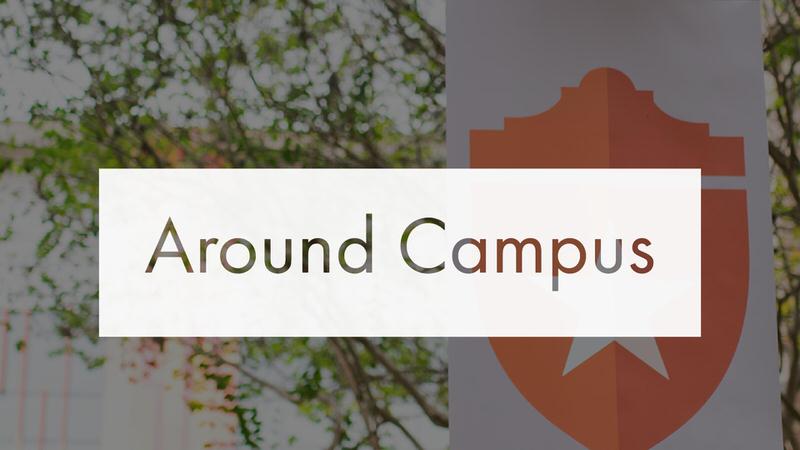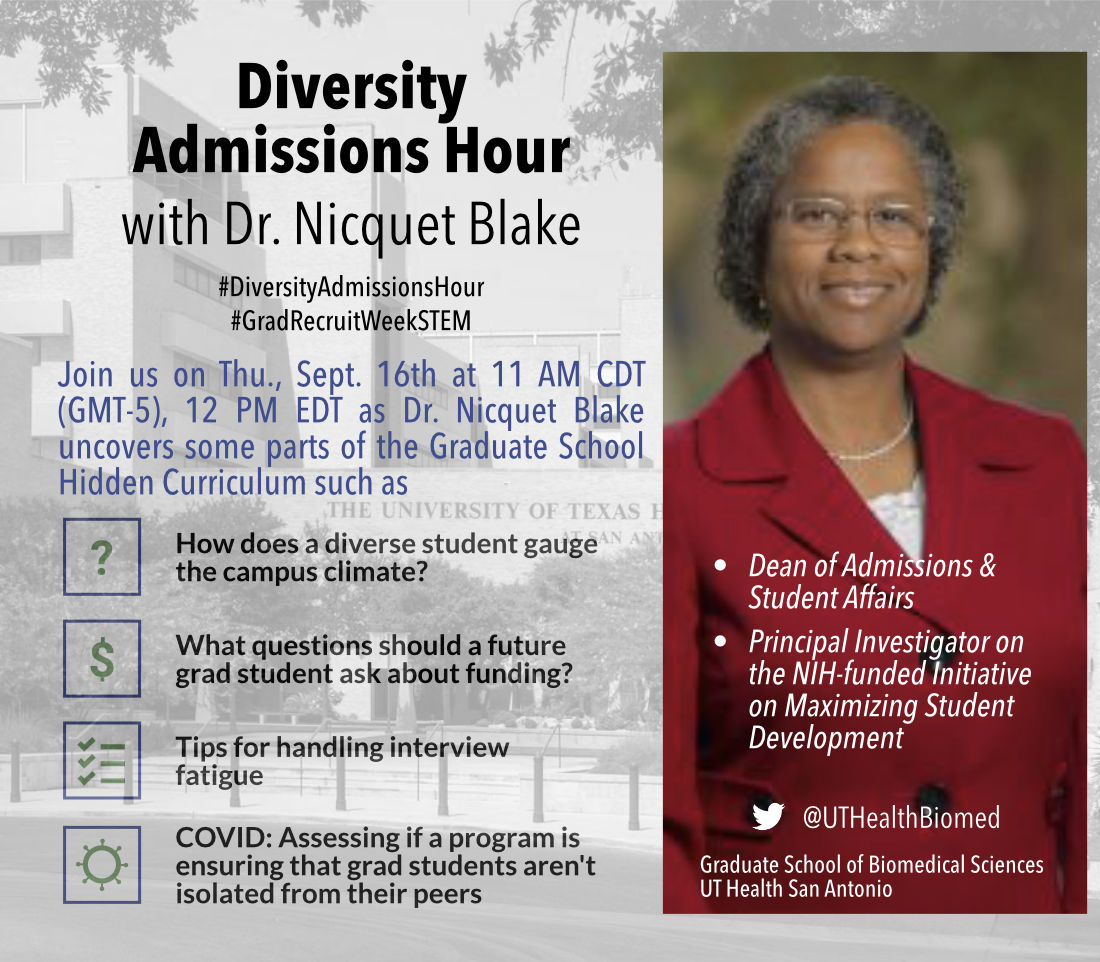Dr. Blake on Twitter for #GradRecruitWeekSTEM

Dr. Nicquet Blake is the associate dean for admissions & student affairs at the Graduate School of Biomedical Sciences at the University of Texas Health Science Center in San Antonio. As part of our Graduate Student Recruit Week in STEM, (#GradRecruitWeekSTEM) she will answer our (and your) questions about the graduate school admissions process while uncovering some parts of the hidden curriculum for diverse students.
Date and time: Thursday, Sept. 16th. 11 AM CDT (GMT-5), 12 PM EDT.
Where: Twitter @YouInTheLab
Some topics include:
- How does a diverse student gauge a particular department’s climate?
- What questions should a future grad student ask about funding?
- Tips for handling interview fatigue.
- COVID: Assessing if a program is ensuring that grad students aren’t isolated from their peers

Today in our #DiversityAdmissionsHour chat, Dr. Blake will uncover some parts of the #HiddenCurriculum for diverse students applying to #GradSchool. If you’d like to chime or ask her a question, well, you know what to do. #GradRecruitWeekSTEM pic.twitter.com/QroYpTE21L
— Undergrad In The Lab (@youinthelab) September 16, 2021
Welcome Dr. Blake. Thank you for taking time out of your very busy schedule to share your experience and expertise with our community members. #DiversityAdmissionsHour #GradRecruitWeekSTEM @UTHealthBiomed
— Undergrad In The Lab (@youinthelab) September 16, 2021
Q1: We’re starting w/ a set of complicated but essential questions. For students who won’t be able to visit campuses this year for an interview or recruitment weekend…
How does a diverse student gauge the campus climate? #GradRecruitWeekSTEM @UTHealthBiomed
— Undergrad In The Lab (@youinthelab) September 16, 2021
Q2: Okay. Let’s go further into the campus bubble.
How does a diverse student gauge a particular department’s climate? It seems that all of your answers would apply there but are there other tips?#DiversityAdmissionsHour #GradRecruitWeekSTEM
— Undergrad In The Lab (@youinthelab) September 16, 2021
A2: true, but I think there are some nuances. Here I think it is sometimes easier to spot. Departments are relatively small and collegial relationships should abound. are you seeing/hearing evidence of those relationships?
— UT Health San Antonio Grad School (@UTHealthBiomed) September 16, 2021
the department is trying to convey and the reality of the stakeholders they have selected to interact with you. finally, go off script.
— UT Health San Antonio Grad School (@UTHealthBiomed) September 16, 2021
are you interacting with a diverse group of students? are there some students who are simply quiet? if they are, make a point to reach out to them ‘off-line’ and ask them about their experiences. What you are trying to reconcile is ‘is there consistency between the message
— UT Health San Antonio Grad School (@UTHealthBiomed) September 16, 2021
Q3: And because the lab environment you’ll be working in is important for your well-being and productivity….
How does a diverse student gauge the culture of a specific lab?#DiversityAdmissionsHour #GradRecruitWeekSTEM
— Undergrad In The Lab (@youinthelab) September 16, 2021
A3: same message… speak with a diversity of people… in this case the mentor, the lab members, but don’t forget the folks that work across the hall. ask me why??
— UT Health San Antonio Grad School (@UTHealthBiomed) September 16, 2021
Q4: Some grad recruitment weekends are virtual. This doesn’t give students the same type of opportunities to interact with potential labmates, PIs, & admins as an in-person visit. How can a student prepare for this? #GradRecruitWeekSTEM
— Undergrad In The Lab (@youinthelab) September 16, 2021
A4 – for schools that really “understand” recruitment, they will try to find ways for you to interact with many different stakeholders in their institution. be prepared for lots of conversation. your days will likely be long… SLEEP the night before.. most importantly, RELAX
— UT Health San Antonio Grad School (@UTHealthBiomed) September 16, 2021
Q5: Undergrads often ask us how to choose a #GradSchool. You shared a strategy w/ me that you suggest to applicants as relates to the UT “umbrella” program. It’s good advice for stud. considering multiple schools & other #mentors might want to share it. #GradRecruitWeekSTEM
— Undergrad In The Lab (@youinthelab) September 16, 2021
Just to make sure we all understand what an umbrella program is, those are programs with students essentially come in as stem cells, undifferentiated, and the program is designed to give you the experiences that will help you make a decision about your scientific path.
— UT Health San Antonio Grad School (@UTHealthBiomed) September 16, 2021
umbrella programs are great because you do not have to know exactly what you want to do prior to starting the program. But if you do that's OK too, because now you can forge collaborations under that umbrella.
— UT Health San Antonio Grad School (@UTHealthBiomed) September 16, 2021
These are really good for a students who have multiple interests and have difficulty deciding on a single one right out of their undergraduate program.
— UT Health San Antonio Grad School (@UTHealthBiomed) September 16, 2021
Q6: How many programs do you suggest that an undergrad apply to? And/or Have you noticed any trends on the number of graduate programs undergrads are applying to?
#DiversityAdmissionsHour #GradRecruitWeekSTEM— Undergrad In The Lab (@youinthelab) September 16, 2021
Q7. The application fees (or fees required to send GRE scores to a grad school) add up quickly. This is a burden for students who don’t have the economic resources to cover these for many schools. What tips do you have for these students? #GradRecruitWeekSTEM
— Undergrad In The Lab (@youinthelab) September 16, 2021
Q8: How could a diverse student determine if there are adequate academic and social support programs in place at an institution before they join a graduate program? The tips at the beginning of the chat would apply here too? #DiversityAdmissionsHour #GradRecruitWeekSTEM
— Undergrad In The Lab (@youinthelab) September 16, 2021
Q9: Undergrads (often #FirstGenInSTEM) are surprised to learn that they can receive tuition waivers & $ for entering a PhD program. But financial packages aren’t all the same. When interviewing what Qs should a future grad student ask on this topic? #GradRecruitWeekSTEM
— Undergrad In The Lab (@youinthelab) September 16, 2021
Q10: Undergrads often ask us for advice about choosing between a MD/PhD or PhD program. You must also have conversations on this topic. What strategies do you typically share with potential applicants or the students you mentor? #DiversityAdmissionsHour #GradRecruitWeekSTEM
— Undergrad In The Lab (@youinthelab) September 16, 2021
Q 11: What questions should a student ask to gauge how a program or department is ensuring that grad students who start during the pandemic aren’t feeling isolated or disconnected from their peers? #DiversityAdmissionsHour #GradRecruitWeekSTEM
— Undergrad In The Lab (@youinthelab) September 16, 2021
Q 12: You have a theory about “interview fatigue” and how it can affect a student’s ability to self-assess whether a program is right for them. What can a student do to combat it or push through it? #DiversityAdmissionsHour #GradRecruitWeekSTEM
— Undergrad In The Lab (@youinthelab) September 16, 2021
Last Q.
Q13: In an off-line conversation, you said that you encourage students to “trust your blink instinct” when making decisions. Please share this concept w/ our audience & how a student would do this after a #GradSchool interview or recruitment weekend. #GradRecruitWeekSTEM— Undergrad In The Lab (@youinthelab) September 16, 2021
Thank you for taking the time to chat with us today, Dr. Blake!
And for those following along, check out @UTHealthBiomed for information on their more than 20 cutting-edge #biomedicalscience graduate programs https://t.co/uXWiciOJqZ
— Undergrad In The Lab (@youinthelab) September 16, 2021
